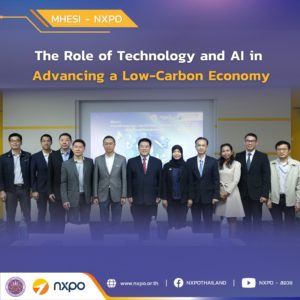An event showcasing initiatives in science, research, and innovation (SRI) that support legislative functions was held at the Parliament House on 3-4 October 2023. The event was inaugurated by Mr. Wan Muhamad Noor Matha, President of the National Assembly on 3 October and was organized by public organizations operating within Thailand SRI system, including NXPO. The event featured a policy forum and exhibitions in six key areas: 1) social inclusion, 2) agriculture & food, 3) climate change, 4) public health, 5) aging society, and 6) workforce development.



NXPO President Dr. Kitipong Promwong highlighted the role of higher education, science, research and innovation (HSRI) in addressing critical issues facing the country:
- Economic Challenge: HSRI has the potential to free Thailand from the middle-income trap. To achieve high-income status, the country needs to raise its per capita income to THB 400,000 per year or THB 30,000 per month, while the current average monthly income is THB 7,000. HSRI is expected to contribute to this cause by 10%.
- Income Inequality: The income gap between the highest and lowest earners in Thailand is widening, leading to social disparities. This has become a major challenge for Thailand.
- Social Challenges: HSRI can help foster family institutions, and promote unity and inclusivity in communities, thereby leading to a high-quality society.
- Sustainable Development: The impact of climate change on the agriculture, public health and natural disaster is enormous. Research and innovation are needed to develop solutions and adaptations.
- The Future of Thailand: Thailand’ future relies on knowledge and human capital. The country needs to invest in research in advanced areas such as high energy physics, genomics, satellite technology and astronomy. Human resource development must cover all stages of life to ensure the country has a skilled workforce for national development.

Dr. Kitipong described the importance of the National Higher Education, Science, Research and Innovation Policy Council (Policy Council). The Policy Council, chaired by the Prime Minister and comprising 10 ministers and experts, plays a crucial role in making decisions on policies related to manpower and science development. Multiple initiatives have been introduced by the Policy Council to address the country’s challenges, including an aging society, household debt, climate change, emerging diseases, rapid technological advancement, and water, energy, and food security.

In discussing the future of Thailand, Dr. Kitipong noted the significant progress in Thailand’s scientific infrastructure over the past 30 years. Thailand’s research and development investment has increased from 0.22% to 1.21% of GDP. Several initiatives have been introduced to make Thailand thrive into the future, including the Innovation Driven Enterprise (IDEs) which aims to create 1,000 IDEs with an average income of THB 1 billion. To achieve this ambitious goal, several measures have been devised. These include a holding company scheme that encourages universities to establish a holding company to effectively engage in business activities, and regional science parks that are working with a network of 55 universities across the country to boost enterprise’s innovation capacity and the grassroots economy.


NXPO Vice President Dr. Siriporn Pittayasophon stated during the social inclusion session, that the number of poor people in Thailand, earning less than THB 2,800 per month, is estimated at 4.4 million. Poverty alleviation is the focus of the central government and every government bodies, providing an opportunity to leverage the potential of SRI to address this national problem through increased access to education and grassroots economic development. These projects are implemented by nine public funding agencies and universities situated throughout the country, with the support of infrastructures such as pilot plants and multimedia laboratories.


During the climate change session, NXPO Vice President Dr. Surachai Sathitkunarat stressed the need for global efforts to address climate change. This worldwide effort is led by the Conference of the Parties (COP) to the United Nations Framework Convention on Climate Change (UNFCCC). Thailand, as a party to the UNFCCC, has pledged to enhance its contribution to achieve carbon neutrality. NXPO serves as Thailand’s focal point for the development and transfer of climate technology in the UNFCCC, and is responsible for designing sustainable development policies, encompassing renewable energy, energy conservation, the hydrogen economy, and technology adaptation in agriculture and health. In addition, NXPO is currently implementing the Saraburi Sandbox, which incorporates engagement from the private and public sectors in driving the development of a net-zero city.






